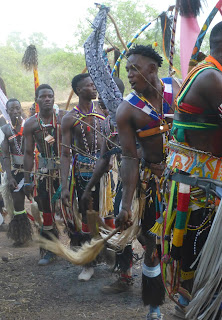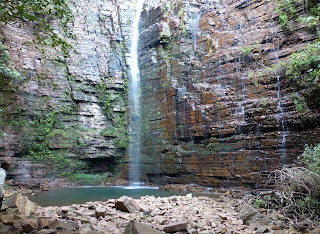Starting this post with a very poor quality photo - but you get the idea, I'm sure. It is a poster currently displayed on many sites around town, advertising a popular series (now in its third season) on local television, called "Mistress of a married man". The one at my local bus stop, having been up for a month, has now been replaced by a condom advert.
I've been thinking about this, and many other aspects of society here, as my life begins to justify the title of my blog that I am "in" Senegal rather than, as previously, it being a transit point between my travels to other countries.
Remind yourselves that this is a 95% Muslim country, ranked in one 2019 study as the second most religious country in the world, where life is based around the family. But now that I'm spending all my time here, starting to get a deeper understanding of the country, I'm seeing much more of the many contradictions that lie just below the surface. Yes, the people here are very religious - their belief in Allah is central to their lives - but that doesn't seem to mean that they have to follow all of its requirements!
Affairs outside of marriage seem to be very common. I asked a friend about this, and he told me that his behaviour was allowable since the religion permits up to four wives, and realistically he cannot be expected to choose a second wife without 'trying her out' first! I have yet to get a more 'official' view on this - maybe something for me to ask about in Saudi Arabia, if my December trip goes ahead! At the same time, women here have quite a lot of clout. Not only are 42% of parliamentary seats held by women (putting Senegal in the top ten internationally for female political representation), but amongst the small wealthy section of society, women have a lot of money. As one rather resentful Senegalese man explained to me, the Koran requires the man to pay all household costs - the rent, utility bills, food, etc - so if the woman has any income, that money is hers and she can do whatever she wants with it. So, as he pointed out, many of the smart (expensive) SUVs driving around are owned by women (not obvious as their drivers will always be male). Certainly the outfits (both the clothes and the jewellery) that some women wear on nights out is astonishing.
Alcohol is another contradiction. Forbidden by the Koran, it is nevertheless widely consumed. Of course there are the more expat-orientated places that serve it, such as the beach-side bars - although a good proportion of the clientele at such places are Senegalese - but additionally, every neighbourhood has a wall with a nondescript metal door behind which is a beer garden of some kind. This may well be different out in the villages, but in Dakar it seems that most people drink alcohol. Indeed most supermarkets have a whole aisle of beers, wines and spirits - certainly far more than could be consumed by the expats and the 5% Christian community! It is, however, consumed behind closed doors and not to excess, which thankfully means that there is no public drunkenness.
There is no clear religious prohibition against cannabis (although some Sunni scholars class it as an 'intoxicant' and therefore forbidden), and it is surprisingly common. The Bayefall community (a particularly Senegalese sufi Islamic sect) consume it as part of their beliefs, alongside music, to get closer to Allah. Whilst there seems to be tacit acceptance of its use by the Bayefall, it is illegal, and the local press seems to be full of news articles on seizures of yamba, as it called locally. I note, however, that some of the seizures are from police officers and religious leaders! There is also - within Dakar, at least - a group of reggae adherents who hold all-night reggae parties, at which yamba is consumed freely, with the police standing guard outside ... I've been told that the organisers acquire a 'special licence' for this...
Some Senegalese have told me that they are a nation of hypocrites, but I think you could also say that they are tolerant and open-minded!

















